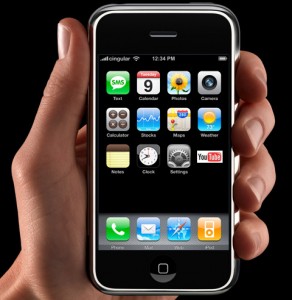The “Wallet” That Will Crush An Entire Industry
The “Wallet” That Will Crush An Entire Industry
 When I was in grade school, a sign of status and importance among the students was whether you owned a watch. During that time (the 1960’s), watches were expensive and most parents didn’t see the need for a young student to have a watch. The rule in the home I grew up in was that unless we received a watch as a gift from a relative or bought our own, we had to wait until we were in 8th grade before our parents would buy us a watch.
When I was in grade school, a sign of status and importance among the students was whether you owned a watch. During that time (the 1960’s), watches were expensive and most parents didn’t see the need for a young student to have a watch. The rule in the home I grew up in was that unless we received a watch as a gift from a relative or bought our own, we had to wait until we were in 8th grade before our parents would buy us a watch.
I remember getting my first wristwatch when I was in 8th grade. I’ve worn one ever since, and now, 41 years later, I feel lost when I don’t have a watch around my wrist.
Today, very few of the people under the age of 30 wear a wristwatch. It wouldn’t even occur to me to buy a watch as a gift for one of my children. They wouldn’t bother wearing it. Georgette used to wear a wristwatch, but it stopped working a few years ago and she didn’t see a need to replace it.
Nowadays people don’t need watches because their cell phones (which always show the correct time with a large digital display), are always within reach.
I recently read that within a few years, most people will no longer have the need to carry a wallet. The “new wallet” will be a “smartphone,” such as an iPhone, Android, or Blackberry. A smartphone is the equivalent of a personal pocket computer that is equipped with mobile phone functions and has the ability to access the internet.
One feature of the smartphone is that is can store a person’s debit and credit card information. Before long, all a person will need to do to purchase an item at a store will be to locate the debit or credit card information on the phone, and then sweep the phone over an electronic device (like we do to unlock the door to the new adoration chapel).
The same thing can currently be done with a coupon. All a person needs to do is display a coupon that was downloaded from the internet or received as a text message, and then sweep the smartphone across an electronic device.
A smartphone can also be used to collect someone else’s contact information. All a person needs to do is sweep the phone over a small UPC-type code on a print ad, computer monitor, or business card, and the business name, address, telephone number, email address, and any other coded information will instantly be imported into the phone’s memory.
In my office, next to my (real) telephone is a “rolodex” that I bought over 20 years ago. If you don’t know what a rolodex is, it’s a plastic case that has two tracks along the bottom that small note cards clip onto. The contact information for friends, family members, and business acquaintances is written on the cards and the cards are then clipped into the rolodex in alphabetical order. I use my rolodex almost every day. My children use their cell phones to look up the phone numbers they want to call. They don’t need a rolodex.
A few years ago my son Harry optimized my law firm websites so that when a person in the Central Illinois area searches the internet for certain areas of law, my websites show up on the first page that appears on the computer monitor. One of my goals for 2011 is to further optimize my websites for people who are conducting searches on their smartphones for a local attorney.
In order for me to optimize my websites for local mobile searches, I need to have a working knowledge about “Google Places,” so I’ve been studying up it. I’m in the process of learning some of the language and techniques for optimizing sites for mobile searches, which include the use of “Citations,” “QR Codes,” and “Tags.”
Over the past 8 years, I’ve periodically consulted with a marketing expert and he has repeatedly reminded me that if I’m in the same business 3 years from now (that I’m in today), I will be on my way to going out of business. Because of the rapid changes in technology and the shift that has taken place in the economy, the marketing consultant is adamant about the need for business owners to learn about and adopt whatever marketing tools that are available to gain an edge on the competition.
There are over 5.4 billion cell phones in the world. That’s almost one cell phone for every man, woman, and child on the planet. About 20% of those phones are smartphones. That percentage is going to increase dramatically over the next 5 years.
Google is currently in the process of setting up “place pages” on the internet for every business in North America (and later, the world). Once the ownership of smartphones reaches critical mass, the yellow pages will become extinct, because the vast majority of people will use their phones to look up businesses, addresses, and phone numbers.
I ran my first display ad in the yellow pages in 1984. I stopped running display ads in the yellow pages in 2008. That’s when I shifted my resources over to optimizing my law firm websites on the internet and running pay-per-click ads with Google.
It’s only a matter of time before Google completely crushes the entire yellow page industry. And it’s going to be done through the use of the “new wallet” – the smartphone. If I’m not willing to take the time to learn about and embrace this new technology, my business will eventually die.
So where am I going with all of this talk about technology and the smartphone?
We have to be very careful about how enamored we become by all of the “new” technology that is coming our way. Let’s say that 10 years from now we have the know-how and technology to clone human beings. Will we then have the “right” to take advantage of that technology and pay a doctor to harvest an organ from one of those cloned humans so that it can be transplanted into the body of a “real” human?
What if all of the religions of the world except one – the Catholic Church – declare that the cloning of humans and the harvesting of their organs is acceptable in the eyes of God? What if the Catholic Church says that a cloned human is endowed by God with a soul, and that the cloning of humans and the harvesting of their organs is a grave (mortal) sin?
Who on this earth ultimately has the final say as to what’s acceptable in the eyes of God? As Catholics, we know the answer to that question. It’s the Vicar of Christ on earth – the Pope. There will always be a line of communication open between Heaven and earth. That’s what the Son of God promised us. That line of communication is plugged directly into our Church.
As we travel through these new waves of discovery and technology, we need to pray that we will always have the grace and courage to adhere to Gods laws, because ultimately it is the adherence to His laws that will determine where our souls (and glorified bodies) will reside for all eternity.




2 Comments
Dear Harry and Georgette –
Your technical knowledge is amazing to me! As I read your article just now on my computer (yes, I can do that!) The vastness is almost beyond {my}comprehension. This makes me smile and relax! You see, I have an advantage: God blessed me with life 85 years ago, which makes me 84. I’m retired (partially!), living within my very blessed Community of St. Joseph. So far, I’m able to keep up with the technology I need as I pay the bills and take care of repairs for our Convent as needed. How more blessed could I be! I thank my God every day. I was once asked to count my blessings as my Penance. I’ve never completed that Penance! Sister Roberta
Sister Roberta,
Thanks for your regular posts and support. You’re good for at least another 20 years, so keep up the good work!
Harry